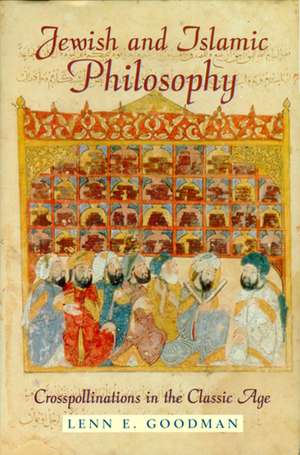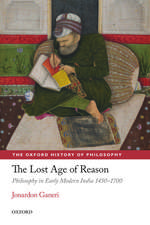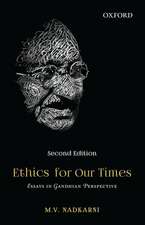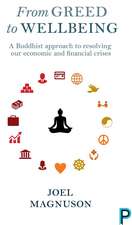Jewish and Islamic Philosophy: Crosspollinations in the Classic Age
Autor Professor Lenn E. Goodmanen Limba Engleză Hardback – 31 iul 1999
Preț: 447.95 lei
Preț vechi: 581.75 lei
-23% Nou
Puncte Express: 672
Preț estimativ în valută:
85.72€ • 91.66$ • 71.47£
85.72€ • 91.66$ • 71.47£
Carte tipărită la comandă
Livrare economică 17 aprilie-01 mai
Preluare comenzi: 021 569.72.76
Specificații
ISBN-13: 9780813527604
ISBN-10: 0813527600
Pagini: 248
Dimensiuni: 159 x 241 x 25 mm
Greutate: 0.55 kg
Ediția:None
Editura: Rutgers University Press
Colecția Rutgers University Press
ISBN-10: 0813527600
Pagini: 248
Dimensiuni: 159 x 241 x 25 mm
Greutate: 0.55 kg
Ediția:None
Editura: Rutgers University Press
Colecția Rutgers University Press
Notă biografică
Lenn E. Goodman is an American philosopher. His philosophy, particularly his constructive work, draws from classical and medieval sources as well as religious texts. Goodman is also an academic, scholar, and a historian with research interest in metaphysics, ethics, and Jewish philosophy.
Cuprins
Preface
Abbreviations and short titles
1. Crosspollinations
Abbreviations and short titles
1. Crosspollinations
1. Hearing God's voice in words
2. "He who knows himself knows his Lord"
3. God's act in history
2. "He who knows himself knows his Lord"
3. God's act in history
2. Razi and Epicurus
1. Perception and sensation
2. Pleasure and pain
3. Desire, motivation, and free will
4. Razi's Ethics and the ethical transparency of hedonism
2. Pleasure and pain
3. Desire, motivation, and free will
4. Razi's Ethics and the ethical transparency of hedonism
3. Bahya and Kant
1. The antinomy
2. Bahya's response
3. The philosphical impact of Bahya's approach
2. Bahya's response
3. The philosphical impact of Bahya's approach
4. Maimonides and the Philosophers of Islam
1. Creation
2. Theophany
2. Theophany
5. Friendship
1. Friendship as reciprocated virtue
2. Biblical, Rabbinic, Maimonidean and Qur'anic fellowship
3. Miskawayh on friendship
4. Friendship in al-Ghazali
2. Biblical, Rabbinic, Maimonidean and Qur'anic fellowship
3. Miskawayh on friendship
4. Friendship in al-Ghazali
6. Determinism and freedom in Spinoza, Maimoonides and Aristotle
1. Aristotle's determinism
2. Maimonides' determinism
3. Spinoza's determinism
4. Spinoza's defence of human freedom
5. Maimonides on character and freedom
6. Freedom and akrasia
7. Conclusion
2. Maimonides' determinism
3. Spinoza's determinism
4. Spinoza's defence of human freedom
5. Maimonides on character and freedom
6. Freedom and akrasia
7. Conclusion
7. Ibn Khaldun and Thucydides
1. A science of history and civilisation
2. Governance in history
Bibliography
Index
2. Governance in history
Bibliography
Index
Recenzii
Lenn E. Goodman, one of the world's most elegant and prolific students of medieval Jewish and Islamic philosophy, argues convincingly that the reason that Jewish authors found so much of Islamic philosophy, pietism, mysticism, jurisprudence and grammar congenial was that Islamic ideas in these fields were rooted in Biblical categories . . . sharpened by Greek analysis [and] rendered vivid by Greek imagery. . . . At its best Goodman's work remains one of that of the Tosafists: an attempt to derive from painstaking textual analysis a glimpse of the broader principles informing these texts. Goodman is a master of rising from details to ever higher levels of abstraction and it is at the highest levels of abstraction that Greek, Muslim, and Jewish thought meet.
Goodman's nearly poetic writing is vivid and accessible beyond narrow professional confines. . . . This work argues forcefully that cross-pollination not only afforded freshness and strengths to the giants of Islamic and Jewish philosophy in 11th and 12th-century Spain, but that it offers the same to us today. Recommended.
Professor Lenn E. Goodman is a philosopher and scholar of world-class stature, whose writings have enhanced the intellectual lives of all who work in his field.
He is without doubt one of the outstanding authors in his field.














